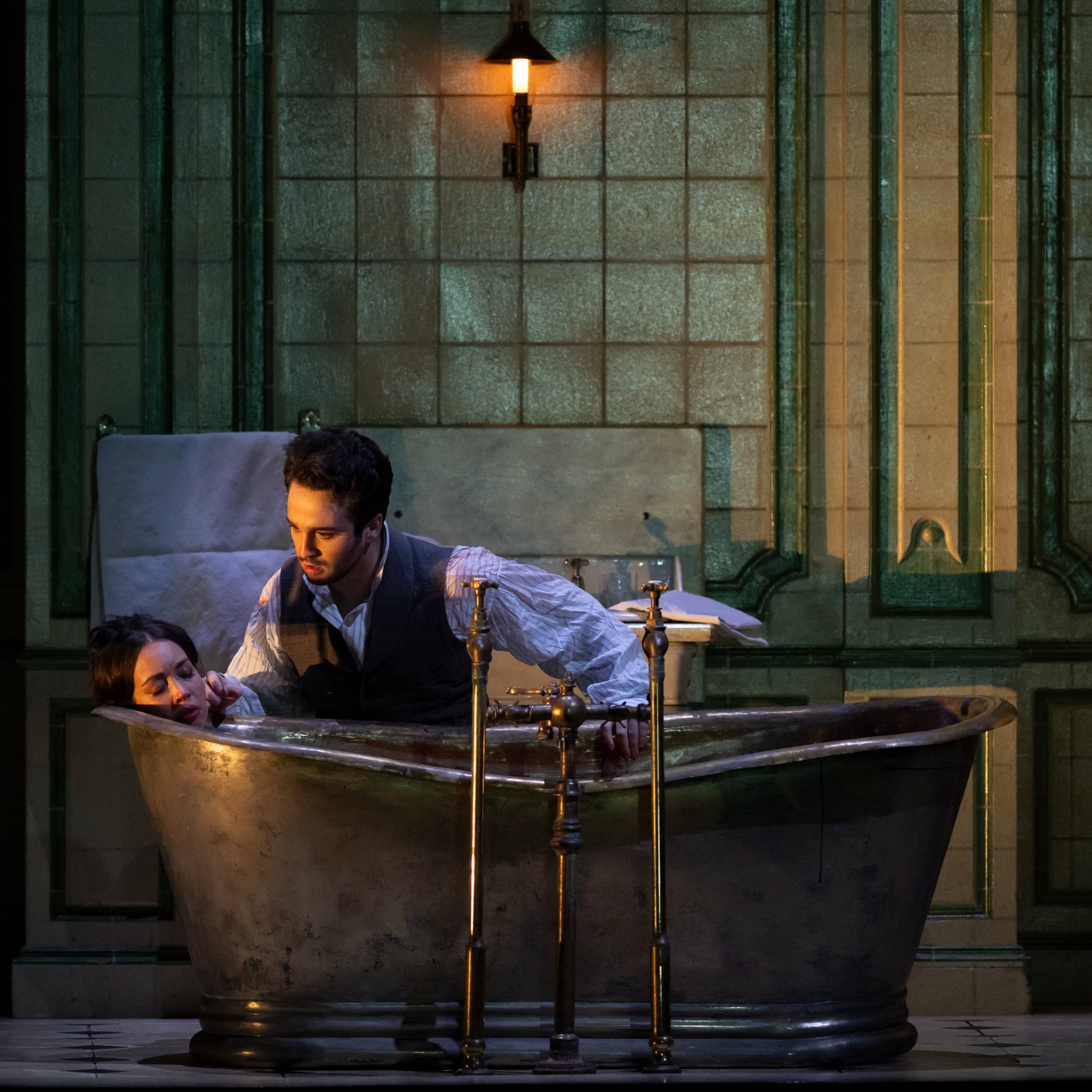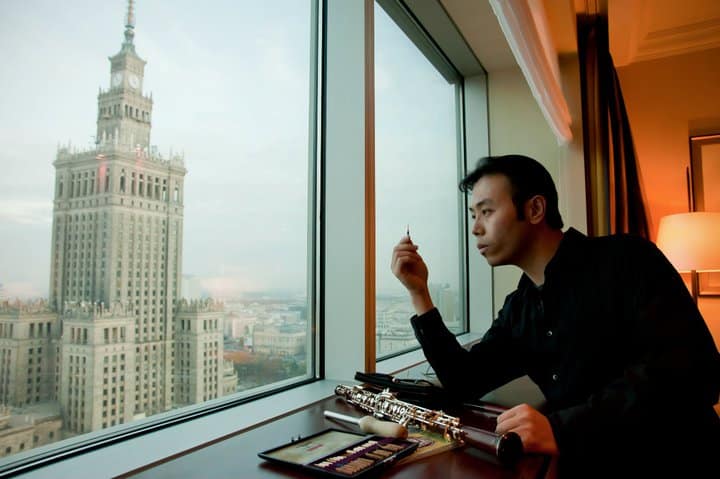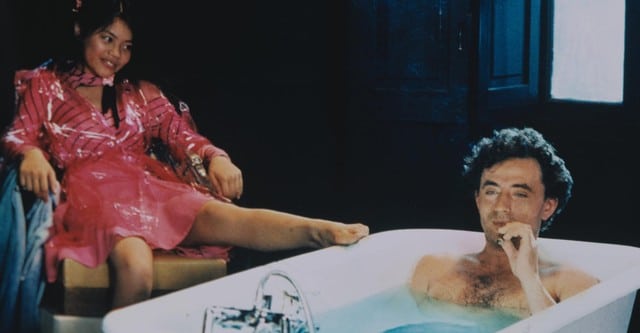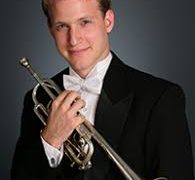Review: Nadine Sierra soars unrestrained in Covent Garden’s Lucia
OperaReview of a strong revival by Alastair Macaulay
Opera is often hailed as a fusion of disparate art forms: words, music, action, and design. Yet “fusion” is often too neat a word for what can prove, for better and for worse, a complex tension that borders on civil warfare. The words and music can pull us in opposite directions, sometimes wonderfully. In many productions, the stage action pulls us in a third and maybe a fourth. When this multi-layered experience succeeds, we’re caught in a thrilling crossfire of separate meanings.
It doesn’t always succeed in Katie Mitchell’s split-focus Covent Garden production of Donizetti’s Lucia di Lammermoor, new in 2016, but it’s remarkable how some of the staging’s original features enter into both your nervous system and the opera’s. Every scene becomes bifocal: action in Donizetti’s dramaturgy is balanced on the other side of the stage by some intimate scene for other characters. Private life, especially the private life of the heroine, is a matter of evading near-constant surveillance.
You can say that Lucia has always been a feminist opera: it shows, very clearly, how men’s inconsiderate mistreatment of the heroine drives her to both madness, murder, and death. But this feminist Lucia shows how Lucia is the latest in a tradition of the oppression of women: one of her ancestors was murdered (for love) by one of her lover Edgardo’s ancestors, her mother is only recently dead – and both these silent female ghosts haunt the action. Lucia and her companion Alisa have to don male attire to get away to meet Edgardo (they look like Laurel and Hardy), but we also suspect from the first that Lucia is pregnant.
By the time Lucia’s cruelly obsessive brother Enrico bullies and cheats her into agreeing to marry another man (Arturo), she is visibly coping with morning sickness. When Edgardo turns up at her enforced marriage to Arturo, she rejoices to share the news with him that she is with child; but then the same Edgardo, appalled to discover she has actually married Arturo, curses her. The prospect of the bridal night with Arturo (played in this revival by the corpulent Andrés Presno) is so repellent that she, aided by the trusty Alisa, kills this husband on the bridal night. And it’s evident that she, actively luring Arturo with sex games before blindfolding and stabbing him, is far from bonkers.
Trying to dispose of his body, however, she has a miscarriage. Now her mental health does indeed become problematic. As she enters the house’s all-male billiard room, she sees both her spectral ancestress and Edgardo (they’re both present onstage, but both as passive wraiths) rather than the many wedding guests. Finally, in her bath, she slits her wrists; Edgardo, already preparing to die in the family crypt when he hears of her demise, rushes to her bathroom, caressing her corpse before slitting his own throat.
How much plot can you handle? As you watch all this (and I’ve missed out plenty of narrative), it’s not hard to be irked by its excesses and clutter. (Mitchell’s 2016 premiere was apparently more excessive yet. The current revival is directed by Robin Tebbutt.) Scenes that are written as private dialogues involve up to eight characters. With so much else going on across the stage, it’s easy to take your eyes off whoever’s signing for whole minutes. (And in the famous sextet it’s anyway impossible to see one of the six singers, Alisa.) The emphasis on women’s suffering – not wrong but heavily emphasised – eventually turns into a form of theatrical passive aggression that diminishes the story’s pathos.
But nothing here is boring or mimsy or evasive. This Lucia matters: it goes head-on for much that is usually left offstage. Other Lucias will be haunted by what this one makes important.
In this revival, it helped that Giacomo Sagripanti took everything at a terrific lick, while allowing the three leading singers to add some unprecedented high notes. Words are admirably bright all round. The American soprano Nadine Sierra, who used to sound pretty but callow, has recently broken through to fresh layers of intensity and poignancy. As Lucia, she holds nothing back, though she doesn’t quite convince in this version’s too-rapid transition from uxoricide to miscarriage to nervous breakdown. As a coloratura, she’s unremarkable in rapid passagework; her strengths are in fully sustained top notes, expressive trills, and fine staccati.
As Enrico, the Polish baritone Artur Ruciński has qualities that recall his compatriot Mariusz Kwiecień (who left the stage in 2020, due to recurrent back problems): an easy stage presence and a dark arrestingly vibrant voice capable of fire and anger. He sustained some climactic top notes for all they were worth (including a top B flat); he’s not especially original or imaginative, but he’s certainly a force for good.
Making his Covent Garden debut as Edgardo is the Spanish tenor Xabier Anduaga, a wonderful discovery for many of us. Can a voice be huggable? His has warmth, sweetness, and immediacy, at one point rising to a high D – and yet it here beautifully expresses tragic passion and despair. (He most nearly resembles Javier Camena in sound, but takes more naturally to painful emotion.) Anduaga is still in his twenties. Casting such as this makes one hopeful for the future of Italian opera.






I was in the audience. It was an evening of virtuoso singing that is rarely heard these days!
The title doesn’t match the lukewarm review of Nadine Sierra (“unremarkable in rapid passagework”)
Also, the writer devotes only 220 words to singers in his 870-word review. That’s my beef with 99% of opera criticism today, where voices take a back seat to the director. Opera should be about singing!
Yes, yes, 100% yes. Opera is about singing. Without the singers, there is no opera. We can enjoy opera by listening to a CD and just imagining the scene, but not the other way around.
You certainly cannot enjoy opera by watching it these days.
But I suspect it’s more due to the lack of vocal knowledge of today’s opera and music critics.
A wonderful evocative review. I, on the other hand heard Jessica Pratt as Lucia singing for Queensland Opera last night. For me a most memorable, magnificent production.
It’s my 2nd time hearing/ seeing her in this role. The 1st time in Melbourne.She only gets better. I can only dream of Covent Garden.
A minimalistic set & costumes. Which worked wonderfully for me. Unlike many on these pages I am no expert, but I found I could focus on the singing in a new way.
This is a good review, especially comments concerning the singers. I was there on Friday, too and liked the production. The scenography and costumes were wonderful. I enjoyed pretty much everything except the miscarriage scene, which I thought was unnecessary and over the top. Does miscarriage feature in the original libretto or is it the director’s invention? In any case it was staged in really bad taste, its only purpose being to cause shock and discomfort in the audience. Pretty much agree about the singers, Nadine Sierra was good but not great.
Just to add, I don’t understand why the ROH doesn’t stage more historical productions such as this? The cemetery scene with ghosts looked amazing, especially the tombstones, which looked almost real. The costumes and interiors were fabulous, too. I am fed up with productions like Aida which was apparently taking place in a military dictatorship similar to North Korea or Nabucco happening in a concentration camp. These productions were a disgrace and I stopped attending anything that looks too modern or seems to have too many directorial interventions.
My favorite lirico-coloratura soprano du jour is Lisette Oropesa. She’s currently singing Sonnambula in Rome. She has come a long way since the Met/Levine days and transformed herself, both vocally AND physically, into belcanto star material.
My favorite lirico-coloratura soprano du jour is Lisette Oropesa. She’s currently singing Sonnambula in Rome. She has come a long way since the Met/Levine days and transformed herself, both vocally AND physically, into belcanto star material.
It could be due to first night nerves but Serra had pitching problems throughout the night though she acted up a storm. Oropesa was way more impressive in this production. Andauga is the real deal, he reminds me much of the young Carreras. Rucinski was equally impressive. I thought the production had too many ideas to the detriment of the drama and the singing. Less is more ….
Disappointing to read, in a generally perceptive review, that it’s apparently acceptable to refer to a (male) singer as corpulent. It has nothing to do with this singer’s performance (having recently worked with Andres I cannot imagine that that was anything less than exceptional) and had such a description been made of a female singer I would think it would, rightly, be called out as offensive. I thought the critical fraternity had moved on from this…
Six and a half paragraphs babbling on about the stage production and a mere 3 for the music. Apparently, all that can be said about the 60-70 orchestra musicians playing for 3 hours is that the conductor chose faster tempi (faster than who and/or what?). Do you have to know anything about music to be a music critic these days? What constitutes “unremarkable” coloratura? How does the tenor express tragic passion and despair? In what way is the baritone’s voice and interpretation not “original” or “imaginative”? When I read a review I actually want to know something about the musical performances. Turns out this critic specialises in dance…
Precisely, scroll up and read my comment.